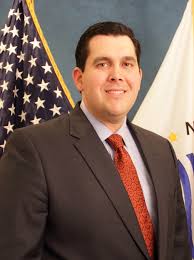The National Native American Hall of Fame announced on Thursday it appointed E. Sequoyah Simermeyer to their board of directors. Simermeyer will work to bring greater awareness to the significant contributions of contemporary Native people by supporting the National Native Hall of Fame and its innovative approaches that help the organization continue to grow its ability to recognize and promote the inspiring stories of tribal leaders and role models.

Simermeyer is the former chairman of the National Indian Gaming Commission, the federal regulatory body for Indian gaming’s over $40 billion industry. He led the federal regulatory perspective on tribal gaming at the national level during significant federal agency regulatory reform, throughout COVID's historic impacts on the gaming industry, amid unprecedented increases in cybersecurity threats to national industries, and during policy formation soon after the Supreme Court of the United States struck down the Professional and Amateur Sports Protection Act of 1992. In his current role as a Vice President for Strategic Partnerships at FanDuel, Simermeyer helps lead FanDuel’s efforts to build sustainable commercial relationships across the United States with a focus on promoting economic development that supports tribal sovereignty.
“In the sports world, I would say that we have added a first-round draft pick to our already loaded board of directors,” stated James Parker Shield, founder and CEO of the National Native American Hall of Fame.
Simermeyer’s professional and academic experience in the field of federal Indian law and policy has made him a respected leader in sustaining tribal gaming’s role as a powerful governmental tool for strengthening tribal economic development, as well as tribal governmental capacity to serve tribal citizens. He has advised members of the U.S. Senate, advocating for Indigenous Peoples’ rights in international fora, and facilitating a national collaboration project aimed at improving the effectiveness of inter-governmental negotiations and partnerships between state legislators and elected tribal leaders.
“I am honored to have the opportunity to support a national organization with an important purpose—honoring Native American achievement in our modern society,” said Simermeyer. “As a Native person and a parent, it is important that we acknowledge the success of Native people and allow those successes to be inspirational stories that instill pride and confidence in future generations who will lift the quality of life for Native people across the nation.”
Simermeyer is an enrolled member of the Coharie Indian Tribe in North Carolina. He graduated from Cornell Law School, Vermont Law and Graduate School, and Dartmouth College.
More Stories Like This
Native News Weekly (August 25, 2024): D.C. BriefsUS Presidents in Their Own Words Concerning American Indians
Indigenous Actor Elaine Miles Reports Detention by Alleged ICE Agents
Happy Thanksgiving from Native News Online
Coming Up on Native Bidaské: Behind the Animation: Joey Clift Talks “Pow” and Native Storytelling
Help us tell the stories that could save Native languages and food traditions
At a critical moment for Indian Country, Native News Online is embarking on our most ambitious reporting project yet: "Cultivating Culture," a three-year investigation into two forces shaping Native community survival—food sovereignty and language revitalization.
The devastating impact of COVID-19 accelerated the loss of Native elders and with them, irreplaceable cultural knowledge. Yet across tribal communities, innovative leaders are fighting back, reclaiming traditional food systems and breathing new life into Native languages. These aren't just cultural preservation efforts—they're powerful pathways to community health, healing, and resilience.
Our dedicated reporting team will spend three years documenting these stories through on-the-ground reporting in 18 tribal communities, producing over 200 in-depth stories, 18 podcast episodes, and multimedia content that amplifies Indigenous voices. We'll show policymakers, funders, and allies how cultural restoration directly impacts physical and mental wellness while celebrating successful models of sovereignty and self-determination.
This isn't corporate media parachuting into Indian Country for a quick story. This is sustained, relationship-based journalism by Native reporters who understand these communities. It's "Warrior Journalism"—fearless reporting that serves the 5.5 million readers who depend on us for news that mainstream media often ignores.
We need your help right now. While we've secured partial funding, we're still $450,000 short of our three-year budget. Our immediate goal is $25,000 this month to keep this critical work moving forward—funding reporter salaries, travel to remote communities, photography, and the deep reporting these stories deserve.
Every dollar directly supports Indigenous journalists telling Indigenous stories. Whether it's $5 or $50, your contribution ensures these vital narratives of resilience, innovation, and hope don't disappear into silence.
 The stakes couldn't be higher. Native languages are being lost at an alarming rate. Food insecurity plagues many tribal communities. But solutions are emerging, and these stories need to be told.
The stakes couldn't be higher. Native languages are being lost at an alarming rate. Food insecurity plagues many tribal communities. But solutions are emerging, and these stories need to be told.
Support independent Native journalism. Fund the stories that matter.
Levi Rickert (Potawatomi), Editor & Publisher

